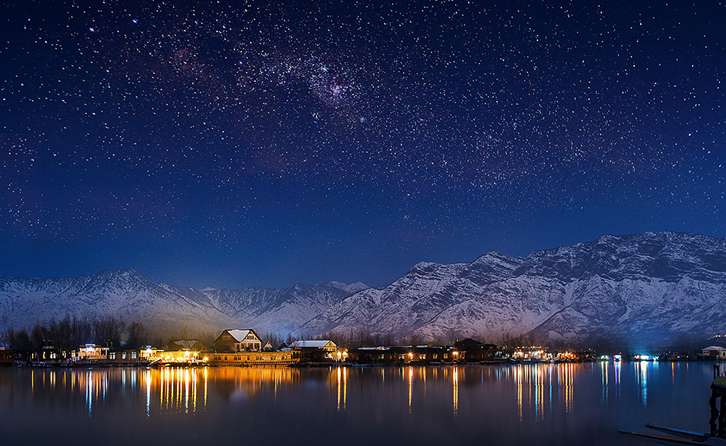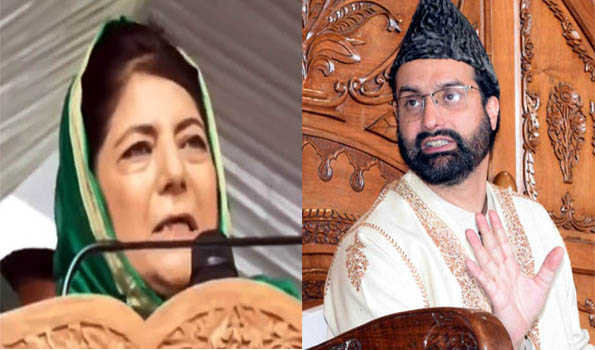Jammu and Kashmir Statehood Demand: Omar Abdullah’s Defiance, Mehbooba Mufti’s Call, Farooq Abdullah’s Optimism & Mehraj Malik’s Detention
By: Javid Amin | 14 September 2025
A Valley in Flux
Jammu & Kashmir today stands at one of its most defining moments since the abrogation of Article 370 in August 2019. The Union Territory (UT), stripped of its special status and statehood, has been governed under a unique political experiment that has combined elected representatives with central oversight through the Lieutenant Governor’s office.
Six years later, the cracks in this model are widening. Calls for the restoration of statehood are no longer abstract promises—they have become urgent demands echoing across the political spectrum. From senior statesman Farooq Abdullah’s optimism, to Omar Abdullah’s shift toward open confrontation, to Mehbooba Mufti’s call for a united Assembly stand, and the uproar over AAP MLA Mehraj Malik’s detention, the signs point toward a region grappling with deep questions of democracy, dignity, and direction.
This article takes a deep dive into these shifting currents: what they reveal about the state of governance in J&K, how they impact the aspirations of its people, and why the road to statehood is no longer a political choice but a constitutional necessity.
Omar Abdullah: From Conciliation to Confrontation
The Early Approach
When Omar Abdullah assumed office as Chief Minister of the Union Territory in 2024, his strategy was cautious. Aware of the limited powers of an elected government under UT status, he sought to cooperate with New Delhi and the Lieutenant Governor’s office. His tone was conciliatory—focused on governance delivery, avoiding public clashes, and maintaining lines of dialogue with the Centre.
The logic was clear: work within constraints, avoid open defiance, and gradually build trust that could pave the way for greater autonomy.
The Breaking Point
By mid-2025, however, the political script began to shift. On Martyrs’ Day (July 13), Abdullah defied house arrest orders and scaled the wall of Srinagar’s Khwaja Naqshband Sahib shrine to honor the martyrs of 1931. The symbolism of that act, especially the viral images of him being pushed back by police, struck a chord with the public. It was the moment Abdullah broke from quiet compliance and chose visible resistance.
Independence Day Rebuke
A month later, on Independence Day, Abdullah directly rebuked New Delhi in his speech, accusing Raj Bhavan of stalling governance and delaying statehood restoration. He announced a signature campaign for full statehood, signaling that his patience had run out.
For the first time, he publicly framed the Centre’s hesitancy as an affront to democracy, moving his politics from cooperative engagement to assertive confrontation.
Rejecting the ‘Hybrid Model’
In interviews, Abdullah has categorically rejected proposals for a so-called “hybrid model” where law and order would remain under central control even after statehood is restored. His argument is simple yet powerful: no other large state in India functions under such dual control, so why should J&K?
“We are not asking for favors,” he emphasized. “This is a promise made in Parliament, and it must be honored.”
With this stance, Abdullah has positioned himself not as a supplicant but as a defender of constitutional rights.
Farooq Abdullah: Optimism Amid Turmoil
If Omar Abdullah has adopted a confrontational tone, his father and National Conference (NC) president Farooq Abdullah continues to strike a note of cautious optimism.
Speaking at a golf tournament in Pahalgam recently, Farooq Abdullah said:
“God willing, that will also happen one day. We are hopeful that Delhi will pay attention to it. The Prime Minister will see to it that the people of Jammu and Kashmir want statehood to be restored.”
For Farooq, political life has been shaped by decades of turbulence—from the tribal raids of 1947 to the militancy of the 1990s and the constitutional upheavals of 2019. His message is one of resilience: J&K has endured crises before, and this too shall pass.
But optimism does not mean complacency. He pointed to the devastating April 2025 terror attack in Pahalgam’s Baisaran meadows, which killed 26 people, mostly tourists, as a severe blow to Kashmir’s tourism economy. The only way forward, he stressed, was to rebuild confidence through peace, unity, and above all, restoring statehood to allow locals to take charge of their destiny.
Mehraj Malik’s Detention: A Political Flashpoint
The Arrest
The detention of AAP legislator Mehraj Malik under the Public Safety Act (PSA) has become the most controversial development of recent months. Malik, who represents Doda, was booked after raising concerns over the relocation of a health centre in his constituency. Instead of engaging in dialogue or referring the matter to the Assembly, the administration invoked the PSA—a law that allows detention without trial for up to two years.
Malik is the first sitting MLA in J&K to be detained under this law. His arrest has triggered widespread protests in Doda and drawn condemnation from across the political spectrum.
Political Accusations
AAP leaders allege that the BJP orchestrated the move to silence dissent. “This is not just administrative overreach—it’s political suppression,” said AAP spokesperson Mudasir Hassan.
Opposition parties, including Omar Abdullah’s NC and Mehbooba Mufti’s PDP, have also condemned the arrest. Legal experts warn that using preventive detention against elected representatives sets a dangerous precedent, where dissent risks being conflated with disorder.
Public Response
On the ground, the detention has sparked anger. Protests in Doda have led to curfews, internet shutdowns, and mass detentions. For many, Malik’s case represents not just an individual injustice but a broader attack on democratic institutions in J&K.
Mehbooba Mufti: Demanding a Special Assembly Session
PDP president Mehbooba Mufti has taken a bold step by urging the Assembly Speaker to convene a special session over Malik’s detention. She argues that a resolution passed by the Assembly could pressure the Centre to release Malik and prevent similar targeting of other MLAs in the future.
“Mehraj can fight his legal battle—what he needs is a strong political stand from the Assembly,” Mufti said during a rally in Kupwara.
She also urged Chief Minister Omar Abdullah to provide legal aid to thousands of poor Kashmiris languishing in prisons across India, signaling that Malik’s case should not overshadow the plight of ordinary detainees.
Her intervention frames the issue not just as partisan politics but as a larger test of whether J&K’s Assembly can defend its members and assert its relevance.
Doda Lockdown: The Human Cost
The fallout of Malik’s detention is most visible in Doda district, where curfew has stretched into its fourth day. Schools remain shut, mobile internet is suspended, and over 80 people have been detained.
Markets in Bhaderwah, Gandoh, and Thathri are closed, while security forces have sealed sensitive areas with concertina wires. Even though no fresh protests have been reported in the last 24 hours, the atmosphere remains tense.
The situation underscores how political decisions reverberate at the community level—disrupting education, livelihoods, and basic freedoms. For many families, this has become yet another reminder of how fragile normal life in J&K remains.
Why Statehood Matters
Local Governance = Responsive Tourism Policy
Under UT status, key decisions on tourism, infrastructure, and law and order are centralized. Restoring statehood would empower local leaders to craft policies tailored to J&K’s unique geography, culture, and seasonal needs.
Trust and Stability
Tourists seek safety and authenticity. A state government with local accountability can better project stability, promote festivals, and rebuild Kashmir’s global image.
Revival of Institutions
Statehood would restore legislative authority, enabling targeted tourism incentives, infrastructure upgrades, and preservation of heritage sites and eco-tourism zones.
Cultural Identity
For Kashmiris, tourism is more than business—it is identity. Statehood restores dignity, giving locals the pride and ownership necessary to sustain authentic cultural experiences.
The Larger Democratic Question
At its heart, the statehood debate is not just about tourism, development, or governance. It is about the dignity of representation.
-
Can elected MLAs function freely if they risk detention under preventive laws?
-
Can a Chief Minister exercise authority if key portfolios remain with the Lieutenant Governor?
-
Can an Assembly assert relevance if it avoids confronting central overreach?
Without answers to these questions, democracy in J&K risks becoming hollow—a façade of representation without real power.
Possible Pathways Forward
-
Restoration of Statehood with Full Powers
The most straightforward solution is honoring the Centre’s promise of full statehood, with law and order returned to local control. -
Judicial Intervention
The NC is exploring a legal challenge in the Supreme Court, which could push constitutional clarity. -
Political Unity
A joint resolution by the Assembly, as suggested by Mehbooba Mufti, could create collective pressure that transcends party lines. -
Civil Society Mobilization
Protests, signature campaigns, and public advocacy—like Omar Abdullah’s initiatives—can keep the issue alive in national discourse.
Bottom-Line: A Region at Crossroads
Jammu & Kashmir today stands between two futures. One is a path of prolonged uncertainty, where central control, preventive detentions, and symbolic gestures continue to alienate the people. The other is a path of restored dignity, where elected representatives govern with authority, public trust is rebuilt, and the region reclaims its place in India’s democratic fabric.
Farooq Abdullah’s optimism, Omar Abdullah’s defiance, Mehbooba Mufti’s call for unity, and the protests over Mehraj Malik’s detention are all chapters of the same story—a story of a region that refuses to accept half-measures when it comes to democracy.
For the people of Jammu & Kashmir, the demand is simple: statehood is not a privilege, it is a right.


